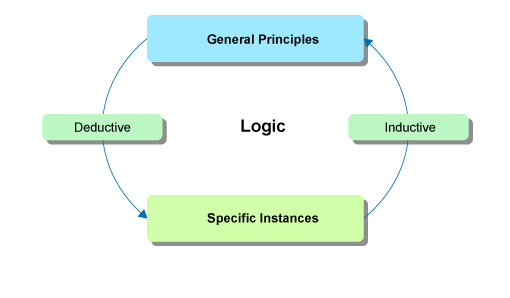1.1 Three forms of logical reasoning
Three forms of logical reasoning are particularly relevant to the judicial decision-making process: deductive, inductive and reasoning by analogy. Deductive reasoning involves starting with a general principle and drawing a specific conclusion based on it. Inductive reasoning involves upturning this process, using specific outcomes to construct a general principle that also applies to the scenario at hand. The relationship between general principles and specific cases in these two forms of reasoning is illustrated by the following diagram:
Reasoning by analogy is sometimes considered a branch of inductive reasoning, but it moves from specific evidence to draw a specific conclusion without constructing a general principle. It relies on one set of facts being sufficiently similar to another set of facts to infer that the same outcome ought to be reached.

